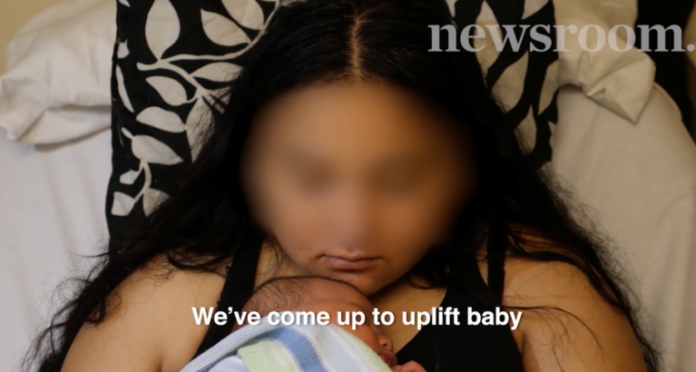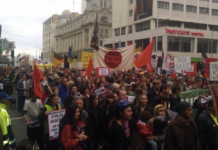News reports this week covered the Coronial inquest into the tragic killing of five-year-old Leon Jayet-Cole – beaten to death by his mother’s partner, despite warnings from Leon’s dad and complaints to the police, the local Canterbury District Health Board and Oranga Tamariki’s predecessor, Child, Youth and Family. Leon suffered from at least 44 injuries including severe blunt-force head trauma, a broken jaw, spinal bleeding and a broken foot. Concerns had been raised about violence and drug use in the house shared by Leon, another child, his mum and her partner, but for all the power of the state, no one saved Leon.
It’s important to remember Leon and the lives of the 14,000 substantiated child abuse victims reported every year, plus those not reported, those who survive, and the many who die. New Zealand’s shocking child abuse statistics put us among the worst in the world, and the death of every child through violence (and other preventable causes) needs to be honoured with lessons learned to reduce the harm, suffering and loss for children of the future.
Instead, the State often perpetuates dysfunctional ‘white saviour’ neo-colonial “child-care” systems that impose ‘solutions’ upon those who are already victims of powerlessness and poverty.
Indeed, also in the news this week, has been the release of and response to the internal review from Oranga Tamariki – the Ministry for Children into its handling of the attempted ‘uplift’ of a newborn baby in Hastings earlier this year. ‘Uplift’ is the euphemism for ‘forceable removal’ of children from their parents, whānau and culture based on suspected or actual risks of harm, that disproportionately target Māori.
Minister for Children, Tracey Martin has refused to watch the Newsroom video that prompted the current review of the Ministry’s ‘uplift’ processes. She has argued that she doesn’t need to view the video to do her job, and that she doesn’t have time. That’s another way of saying she hasn’t seen it as a priority. But if she did, she’d find a practice that was inhumane, scary, muddled, and heavy-handed. The attempted seizure of a newborn baby from his young mum invoked all the repressive tools of the state except the army – the police, social workers, the Family Court, private security firms hired by the District Health Board, Public Relations agents, in an apparently unjustified and prolonged show of power that included an attempted ‘night-raid’ that reinforced powerlessness and hopelessness.
The video has been criticised for being an edited 45 minute version of events that occurred over a 40 hour timeframe. But the young mum and her family were denied due process, natural justice, voice, and opportunity to hear and refute the justifications for the attempted forced removal of their newborn child in a fair and open process. The agency was shown to be endangering the interests of the child it was purporting to protect.
Oranga Tamariki’s review of this incident found that ‘mistakes were made’ in the attempted seizure of the baby from his young and vulnerable parents. The Prime Minister Jacinda Ardern and Minister for Children Tracey Martin expressed disappointment that Oranga Tamariki failed to follow its own processes, and the Minister reinforced a commitment to “push harder, faster, at the frontline level to support our social workers”. Ms Martin reaffirmed her commitment to the Government’s Budget allocation of an additional $1billion over four years to support children in care.
The Minister said earlier that racism and unconscious bias present in Oranga Tamariki reflects these forces present within wider New Zealand society. It’s perhaps a legacy of CYF’s cultural approach to ‘early intervention’, and racial bias that sees Māori children six times more likely to be uplifted than non-Māori children. Three Māori children are uplifted every week in New Zealand and increasing, with many court orders issued based on racial, socio-economic and risk profiling before the children are even born, concentrated in four regions – Northland, Wellington, the North Island’s East Coast and Waikato. There was a 320% increase in Court ordered uplifts and roughly a 60% decline of mandated (with whānau agreement) removal of children from 2015-2018. There has been a 33% increase in babies removed from families within three months of birth over the same period, resulting in a “racialized, regionalised, antenatal and coercive approach” according to Dr Emily Keddell from the University of Otago Social and Community Work Programme. She says, “children from the poorest neighbourhoods are 9.4 times more likely to be removed than those from the wealthiest, and the removal of children most occurs in regions where external stress factors of poverty and inadequate housing were more common”. Keddell says “There really are situations where babies need to be removed. But when the practice of doing so has seen such a significant increase in rates, when that increase reinforces rather than reduces inequalities, when they are only in some regions and not others, when the removals are with less agreement and have such immense ramifications for the usual rights of families, then questions must be asked as to why”.
The Children’s Commissioner, Judge Andrew Becroft in June announced a separate review into Oranga Tamariki’s care and protection of Māori babies from birth to three months old. He said we could not “shrink from the fact in New Zealand that there is a long-term legacy of colonisation that exists and disadvantages… and there is modern day unconscious bias and systemic disadvantage”. “More money needs to go to both state and Māori to make change… structural change including “delegation and devolution” – as well as decolonisation”. “It’s the most broken system frankly imaginable that was inherited” by Oranga Tamariki – across rebranding, reincarnations, and across generations.
Whānau Ora Commissioning Chair, Merepeka Raukawa-Tait, says that “Ex-partie uplift orders are the (Oranga Tamariki) weapon of choice – many sought on a without-notice basis so whānau cannot make a principled case before Court – let alone be in a position to afford access to civil justice.” “The effect is that Oranga Tamariki has had the unfettered power for years to snatch babies from whanau….” “There is no justice – there is only judgement – this is a national travesty.” “It’s shameful and unjust.”
The Hawke’s Bay lawyer involved in the case exposed by Newsroom, has been inundated with traumatised Oranga Tamariki clients who have experienced similar injustices, calling it a ‘humanitarian disaster’.
The emotional and physical harm of children by their caregivers here in New Zealand is also a humanitarian disaster. According to Stuff’s ‘The Homicide Report’, there were 135 homicide victims aged under 15 between 2004 and 2019, though those figures include deaths in car crashes where the person causing the crash was convicted of murder or manslaughter. More than half the child homicide victims were killed by a parent or caregiver. Children under five comprise 12% of all homicide victims.
But as Merepeka Raukawa-Tait says, “The State has never done a good job of caring for children”. The current Royal Commission of Inquiry into abuse in State care also in the news this week, affirms that view. The Inquiry heard that Māori children were more likely to be placed in state care, “pain was passed down from generation to generation; Māori were disproportionately abused; disabled people were treated as numbers; abuse led to crime”.
Nowhere in NZ do observers deny that children’s safety is a serious cause for concern and appropriate action. But when intervention is racially biased, when the risk of harm is often underpinned by structural pathologies that throwing money at social workers won’t address, when Oranga Tamariki (and its forebearers’) practices reinforce powerlessness and exclusion, when generations of children are removed from their homes and cultural identity, when cultural identity itself has been repressed, the forced, state-sanctioned removal of children without due process, adds insult to intergenerational injury.






We know the state doesn’t care by there actions for example when they bring in foreigners to run a controversial department like cyfs/ot and they employ Indians to do case work with Maori.
We know the state doesn’t care by there actions for example when they employ foreigners to run a controversial department like cyfs/ot and they employ Indians to do case work with Maori. Ps- please don’t say i am being racist because i got my information directly from someone who has worked there for many many years and they told me the Indians employed in cyfs aren’t interested in Maori tikanga practises/culture they are there for the money only. So who is employing them they need to get the boot now
If a text book example of Institutional Racism were needed, then this type of Oranga Tamariki baby snatching is certainly an illustrative one.
So many State Services and Departments are rotten to the core–WINZ/MSD, Immigration, ACC etc–ruined in many cases by decades of neo liberal doctrine and branch policy rather than applying the original intent in their legislation.
How dare this Government Department use the term “Uplift” when this practice needs to be exposed for what it really is “Government Sanctioned Abduction”. This enterprise has been operating for over 50 years with disgraceful behaviours being meted out to vulnerable children for generations, and the latest statistics tell us that even now 80% of children taken into care have been abused by their so-called carers.
Close down Oranga Tamariki NOW, and start again with guidance from Childrens Commissioner, Judge Andrew Beecroft, Whanau Ora, Iwi Leaders and others interested in the care and welfare of all our children.
This may not be an easy task, but as we have the worlds worst statistics in child abuse, we need to act now.
Comments are closed.